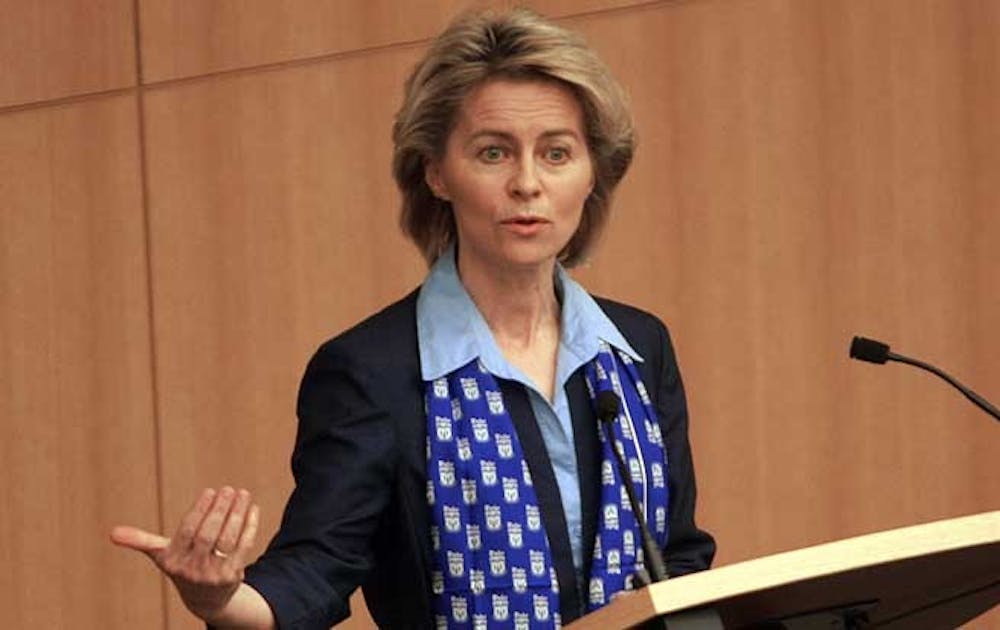Europe needs to strive for increased unity if the European financial crisis is to be solved, said Dr. Ursula von der Leyen, German federal minister for labor and social affairs, in a talk Wednesday.
Von der Leyen addressed more than 70 audience members about the origins of the Euro crisis, current issues with labor and demographics in Europe and the need for a unified fiscal policy among member states of the European Union. As a top labor official in Germany—the nation faring the best in the crisis and with the power to bailout struggling nations—von der Leyen spoke with direct insight into the crisis. The event was hosted by the Fuqua School of Business, the Office of the Chancellor and the department of Germanic languages and literature.
“Only one united Europe with a population of 500 million... guarantees that we will still have a say in the globalized world,” von der Leyen said. “We cannot stop halfway. I have the vision of a political union that I would call at the very end ‘The United States of Europe.’”
Fuqua Dean William Boulding introduced von der Leyen. He noted her capacity to speak from a perspective that encompasses all of Europe, not just Germany.
“In a world where we have incredible interdependence, we need leaders of consequence to deal with issues where what happens one place changes what happens in another,” Boulding said. “[Von der Leyen] is in a position to think about what is Germany’s role in managing the European Union and picking through the Euro crisis, but there is interdependence within the entire world around how we manage the Euro crisis.”
The euro has been quite successful over the last decade, von der Leyen noted. The economic crisis has developed not because of the currency but rather the disconnect in the fiscal policies of different EU members.
“We do not really have a Euro crisis, but what we do have is... a deep crisis of confidence and of trust,” von der Leyen said. “If you want a single money, a single currency for different countries, you need to integrate these countries into a true fiscal and economic coordination.”
When describing lessons Europe can learn from the U.S., von der Leyen frequently referred to her positive experience at Stanford University, where her husband formerly taught alongside Dr. Victor Dzau, chancellor for health affairs and president and CEO of the Duke University Health System.
“We must find our own way that takes the linguistic, the cultural, the mental diversity of our continent into account,” von der Leyen said. “I am convinced that the United States can be a very good role model for us when it comes to speaking to the world with one voice.”
In comparison to many countries in Europe, von der Leyen noted that Germany’s unemployment level is very low—5.5 percent overall and 7.8 percent for people under the age of 25. The country responds to unemployment not with money for the unemployed but with resources, such as training or schooling, to help them gain employment.
“We keep you busy,” she said. “[When] you come into the unemployment agency the first [question] is not, ‘How much money do you need to survive the next month?’ [it] is, ‘What are you able to do? Let’s have a look at your strengths.’”
Addressing the issue of unemployed young people, von der Leyen noted the emphasis on education in Germany, adding that the same focus should be pursued throughout Europe.
“You never let a young person leave without a degree. That has to be the attitude,” she said. “And second, they need a professional qualification—we call it vocational training—so at the very end of their education they are able to have a qualified profession.”
Germany is in need of skilled laborers, von der Leyen noted, adding that European unemployment issues could be solved by having young citizens from other countries such as Spain, which has one of the highest unemployment rates, migrate to Germany to supplement the work force.
Von der Leyen also highlighted problems with employment of women and the elderly. She noted that Germany faces a shrinking work force because women there have been told—though not explicitly—that a choice must be made between having a career and having children. Higher retirement ages, though disliked by many in Europe, are important because they will change the general attitude toward the elderly and help more people become integrated into depleted work forces.
Stephen Grygar, a first-year MBA candidate at Fuqua, said he was impressed by von der Leyen’s ideas for Europe’s economic future.
“She had a really good message about a united Europe, and she had very progressive thoughts, especially for a German minister,” Grygar said.
Junior Olga Mir said she appreciated von der Leyen’s attention to the students who attended.
“I really like how at the end she specifically asked the timekeeper to allow her to answer a few questions from the students,” Mir said. “She was actually interested in hearing the students—that was really nice.”
Get The Chronicle straight to your inbox
Signup for our weekly newsletter. Cancel at any time.

